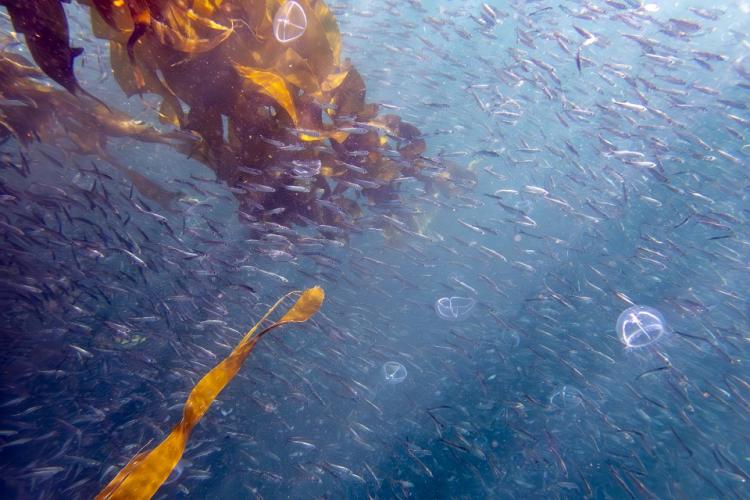
A school of herring in the Strait of Georgia, one of the 230 fisheries analyzed in this study. Credit: Jake Dingwall
A new study analyzing over 230 fisheries has found that their sustainability is likely overstated world-wide. Previous estimates of the number of fish in the ocean globally may have been too optimistic; two-thirds of fisheries in the study had over-estimated the number of fish available when making earlier management decisions.
The study, conducted by University of Victoria marine ecologist Amanda Bates alongside international collaborators at the University of Tasmania's Institute for Marine and Antarctic Studies, was published today in the journal Science. The findings could have implications for the management and long-term sustainability of fisheries.
Currently, in many fisheries, we may be catching more fish than is sustainable. Fisheries feed the livelihoods of many coastal people, and our cultures are intimately tied to fisheries and fishing practices. If we care about future generations and want healthy ocean systems, we need to rethink how we're managing our fisheries."
Amanda Bates, Ecological biologist and Professor of Biology in UVic Faculty of Science
Estimates of how many fish are available in a fishery known as stock assessments are made on a regular basis. These stock assessments, considered to be the gold standard for the scientific management of fisheries, are used by managers to inform their approaches to prevent overfishing, rebuild overfished stocks and protect marine ecosystems.
In this study, researchers conducted a retrospective analysis that compared past estimates of stock size in 230 fisheries worldwide with new estimates for the same year made with more recent data. The study included data from Canadian fisheries, including Pacific herring fisheries in the Strait of Georgia and western Vancouver Island.

Ecological biologist Amanda Bates in the UVic marine research lab. Her research collaboration on world-wide fisheries have found estimates of fish stocks have been over-estimated in two-thirds of fisheries. Credit: UVic Photo Services
The study showed an inconsistency in stock assessments, with results differing between the past estimates and the more recent retrospective estimates. There was a strong pattern of over-estimating stock size for stocks that were the most depleted, and assessments were often too optimistic about the pace of recovery. Fish stock biomass was overestimated by an average of 11.5 per cent.
"A bias towards overestimating fish stocks in overfished fisheries could lock in stock collapse, as the decline in fish may not be noticed until it's too late to take precautionary measures," says Bates. "If we want to avoid collapses in fisheries around the world, which would have far-reaching impacts on ocean health and food security, a more precautionary approach to fisheries management is vital."
Stocks that were in areas with rapidly rising sea temperatures and those that had low economic value were also found to have more inaccurate assessments.
The study concludes that there is room for improvement in how stock assessments are conducted and describes 10 practices that, when implemented together, could increase their accuracy. These practices include: expansion of independent monitoring of fisheries; changes to assessment protocols, including the implementation of a "red team" that looks at potential worst-case scenarios; and the expansion of monitoring in marine protected areas, where fishing is prohibited, so we can better understand the impact of outside factors such as climate change.
This research aligns with United Nations Sustainable Development Goal 13 for climate action and Goal 14 life below water.













